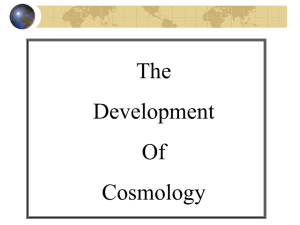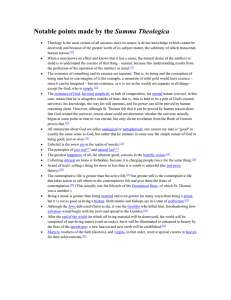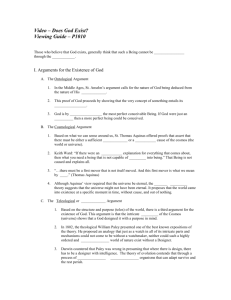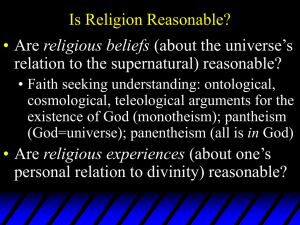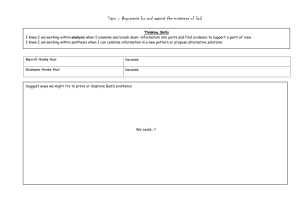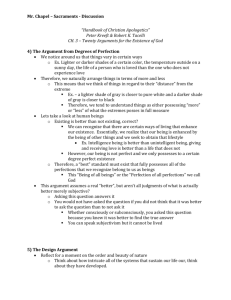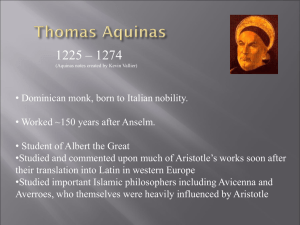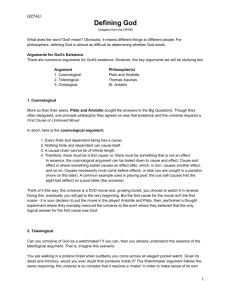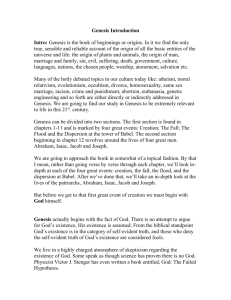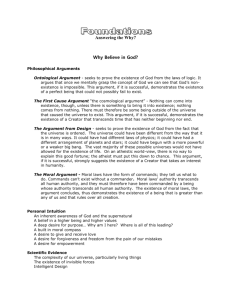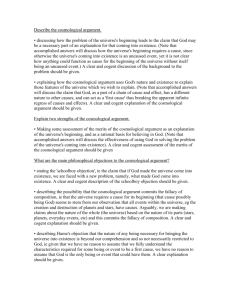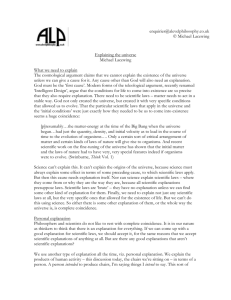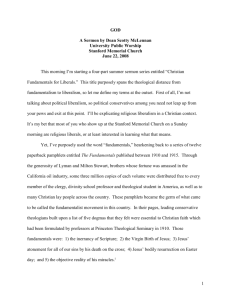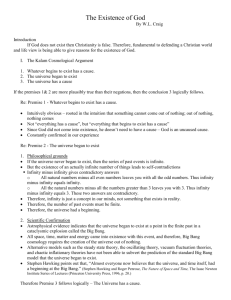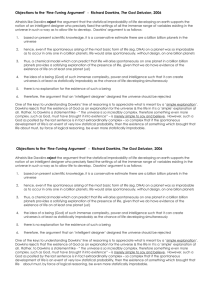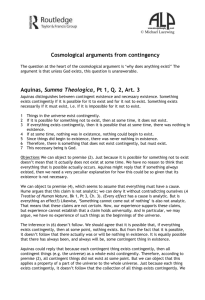Defender #5: *Doctrine of God (3
advertisement
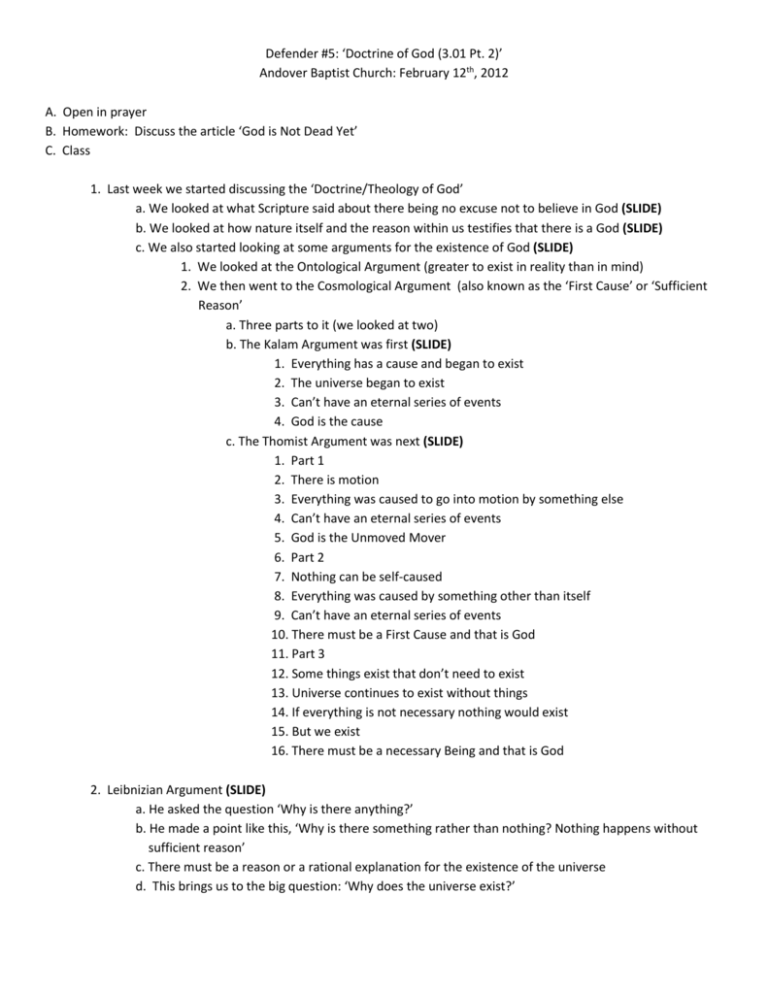
Defender #5: ‘Doctrine of God (3.01 Pt. 2)’ Andover Baptist Church: February 12th, 2012 A. Open in prayer B. Homework: Discuss the article ‘God is Not Dead Yet’ C. Class 1. Last week we started discussing the ‘Doctrine/Theology of God’ a. We looked at what Scripture said about there being no excuse not to believe in God (SLIDE) b. We looked at how nature itself and the reason within us testifies that there is a God (SLIDE) c. We also started looking at some arguments for the existence of God (SLIDE) 1. We looked at the Ontological Argument (greater to exist in reality than in mind) 2. We then went to the Cosmological Argument (also known as the ‘First Cause’ or ‘Sufficient Reason’ a. Three parts to it (we looked at two) b. The Kalam Argument was first (SLIDE) 1. Everything has a cause and began to exist 2. The universe began to exist 3. Can’t have an eternal series of events 4. God is the cause c. The Thomist Argument was next (SLIDE) 1. Part 1 2. There is motion 3. Everything was caused to go into motion by something else 4. Can’t have an eternal series of events 5. God is the Unmoved Mover 6. Part 2 7. Nothing can be self-caused 8. Everything was caused by something other than itself 9. Can’t have an eternal series of events 10. There must be a First Cause and that is God 11. Part 3 12. Some things exist that don’t need to exist 13. Universe continues to exist without things 14. If everything is not necessary nothing would exist 15. But we exist 16. There must be a necessary Being and that is God 2. Leibnizian Argument (SLIDE) a. He asked the question ‘Why is there anything?’ b. He made a point like this, ‘Why is there something rather than nothing? Nothing happens without sufficient reason’ c. There must be a reason or a rational explanation for the existence of the universe d. This brings us to the big question: ‘Why does the universe exist?’ 1. You can’t find the cause within the universe because everything within the universe is dependent upon the universe itself 2. The world is full of contingent things and therefore is contingent upon the universe itself. 3. Existence must be found outside the universe in something Who’s reason for existence is self contained (i.e. It is It’s Own Sufficient Reason for existence) 4. This self explanatory Being is God! 3. The Design Argument for God (SLIDE) a. Design points to a designer b. If you found a sports car in the middle of the desert would you believe that it was a formation that happened over time? 1. Of course not because design points to a designer 2. The same can be said of all that is created c. Explain 1. The complexity of the eye 2. The intricacies of the cell 4. The Consequences we must face if there is no God (SLIDE) a. The Absurdity of Life Without God (SLIDE) 1. Without God you …. a. Are accidental byproduct of nature b. Are the result of matter + time and chance c. Are without purpose and reason d. Are only facing death e. Have no freewill for you are simply driven by nature f. Have no more value than a dog or the flea that feeds off of it (SLIDE) 2. Without God, human life is worthless a. Infanticide is perfectly acceptable b. Abortion is justifiable c. Euthanasia of the elderly is foreseeable d. Suicide is a way out b. The Horror of Life Without God (SLIDE) 1. When life is centered on the self there can be no true satisfaction and ultimately boredom sets in 2. The harder one tries to become ‘ethical’ and ‘good’ the more they realize how far they are 3. Only in the religious life can their be true fulfillment. To refuse this point is to concede to despair. 4. Without God we will cease to exist! a. Several hours, or several years makes no difference! b. We come out oblivion and into oblivion. c. Life is pointless. d. Without God we are simply awaiting our own deaths e. In ‘killing’ God all we have truly accomplished is the killing of ourselves c. Morality is a mirage (SLIDE) 1. We cannot have morality without God 2. Why? There is no higher power to set a standard of right and wrong 3. It becomes everyone’s personal taste and preference 4. Everything is permissible because nothing can be deemed morally good or morally bad 5. War and crimes cannot be judged 6. Simply put it doesn’t matter whether we live like Hitler or Mother Teresa! (SLIDE) 5. Let’s Make a Wager! (SLIDE) a. Blaise Pascal (SLIDE) 1. Became a Christian at the age of 31 2. Died at the age of 39 3. Believed that Christianity could be boiled down to three things a. God can be known b. We are corrupted c. Jesus rectifies both 4. He believed that most people refuse to find an answer to their existence and therefore lose themselves in escape b. He came up with Pascal's wager to challenge that line of thinking (SLIDE) 1. The wager is between a Christian and an atheist 2. The Christian bets there is a God 3. The atheist bets that there is no God 4. If the atheist is correct none of them lose anything and neither one would know who won (although it might be said that the Christian has a healthier lifestyle) 5. If the Christian is correct they win everything and the atheist loses everything 6 Therefore from a simply betting stand point one must logically chose Christianity 7. It is better to POSSIBLY gain all than to POSSIBLY lose all 8. Whether we like it or not, we all have a bet hedged

